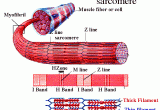Many studies show that a lifetime of vigorous exercise makes the heart stronger and healthier and does not harm it. However, as I reported earlier, a few studies that got a lot of media attention suggested that chronic intense exercise can damage the heart to cause irregular heartbeats.
Now a study of elite lifetime endurance athletes has found no evidence of irregular heartbeats from damage to the right ventricular heart chamber (Circulation, May 17, 2016;133(20):1927-35). Thirty-three world-class endurance athletes, 30 to 60 years old and training for more than 15 hours per week, received extensive heart function tests that were compared to the same number of healthy men who did not have a regular exercise program. Of course the athletes had larger and stronger right ventricles, and there was no evidence of damage or potentially harmful effects. Their hearts pumped more blood, beat at a much slower resting rate, and most importantly, had no evidence of irregular heartbeats called atrial fibrillation that had been reported in an earlier study. Note that the tests in this study were not done immediately after racing, while a previous study (see below) tested the athletes right after a race. This new study shows that athletes with lifelong high volumes of training seem to be very unlikely to suffer from heart disease.

Why the Earlier Studies May Not Show Heart Damage
Forty athletes were tested immediately after a three-to-11-hour cross country ski race and were found to have right ventricular abnormalities (Eur Heart J, Apr 2012;33(8):998-1006). However, the abnormalities returned to normal when the athletes were retested at a later date. This shows that the reported short-term heart muscle damage may really not have been heart damage at all. It could be the same changes that occur after vigorous exercise in all muscles that are exercised vigorously. Your skeletal muscles are supposed to feel sore after vigorous exercise because all muscles in your body show signs of damage after being vigorously exercised, and that can also apply to your heart muscle. All competitive athletes learn very quickly that to be competitive, they have to exercise very intensely. To make a muscle stronger, you have to exercise so intensely that you damage the z-lines that join the sarcomere blocks in muscle fibers. You can tell you are doing this when you feel a burning in muscles during exercise and delayed onset muscle soreness (DOMS) several hours afterwards. When the Z-lines in a muscle heal, the muscle is stronger.
More Evidence that Vigorous Exercise Strengthens the Heart
In another study, male participants in a 54 mile (90 km) cross-country skiing event were followed for several years. Those who skied faster and in more events had slow resting heart rates and had increased rates of atrial fibrillation (European Heart Journal, June 11, 2013;34(47):3624-3631). However, they were not at increased risk for the types of irregular heartbeats in the lower heart chambers that are more likely to kill them: ventricular tachycardia and ventricular fibrillation. Many other studies show that regular exercise is associated with a reduced risk of atrial fibrillation (Heart, 07/27/2015). Olympic endurance athletes, followed for up to 17 years, had no evidence of any damage whatever to the size, shape and function of their main pumping chambers (left ventricles) and suffered no evidence of heart damage or disease (J Am Coll Cardiol, 2010;55(15):1619-1625).
Lack of Exercise Increases Risk for Irregular Heartbeats
Not exercising is a risk factor for atrial fibrillation (Am J Cardiol, 2012 Aug 1;110(3):425-32). A slow resting heart rate in an athlete generally indicates a strong heart, but apparently healthy men who do not exercise and have slow resting heart rates are at increased risk for atrial fibrillation (Circ Arrhythm Electrophysiol, Aug, 2013;6(4):726-31). Obesity is also a major risk factor for atrial fibrillation (J Am Coll Cardiol, Jul 7, 2015 and JAMA, 2004 Nov 24;292(20):2471-7). Elite endurance athletes are virtually never obese and they are unlikely to have high blood pressure, which is a major risk factor for atrial fibrillation (J Am Soc Hypertens, Mar 2015;9(3):191-6).
Most Studies Associate Vigorous Exercise with Increased Longevity
A review of fourteen articles on the life spans and death rates of elite endurance athletes shows that they live longer than the general population, and suffer far less from heart disease (J of Sci and Med in Sport, July 2010;13(4):410–416). Another review of 174 studies shows that even activities such as gardening and household chores are associated with a lower risk of stroke, breast cancer, colon cancer, diabetes and heart disease. Larger risk reductions came with increasing intensity and duration of exercise (British Med J, August 9, 2016). However, one study reported that intense exercise could cause scarring in the heart that may increase the risk of death from heart disease (Mayo Clinic Proc, June 2012;87(6):587–595), and another article questioned the safety of exercising for more than an hour a day (Mayo Clinic Proc, 2014;89(9):1171-1175).
My Recommendations
The existing evidence is that intense exercise is good for you, provided that you have a normal heart and do not have any underlying disease. Of course, if you have chest pain or any questions about your health, you should check with your doctor.
Many different factors can damage your heart. While vigorous exercise can help to prevent heart disease and long-term heart damage, it does not guarantee protection against irregular heartbeats and heart damage. See Atrial Fibrillation in Endurance Athletes
Checked 6/1/23

